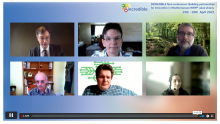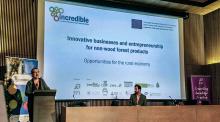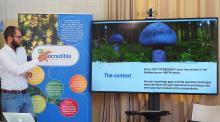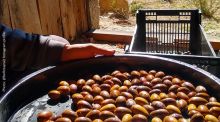Coordinated response to face the effect of climate change, pests and diseases of chestnuts and pine nuts
The Sustainable Forest Management Research Institute (iuFOR) of the University Valladolid and INIA hosted last week in Palencia (Spain) an interregional workshop on ‘Wild harvested nuts and berries in time of new pests, diseases and climate change’.
The meeting brought together participants and stakeholders from Spain, Portugal, France and Turkey, namely researchers, forest technicians, forest managers, public and private forest owners, chestnut growers, processors, and other sectoral actors of pine nut and chestnut value chains. Both nuts are esteemed and emblematic for their contribution to economic development and cultural heritage of rural forest-dominated areas around the Mediterranean.
The scope of the meeting was the presentation and discussion of current challenges which exotic pests, diseases and climate change are putting on chestnut and pine nut production from forests and orchard, and to learn about good practices and remedies applied in other regions, countries or supply chains.
On both cases, participants concluded that the serious threads by introduced harmful exotic organisms have put to an end the traditional way to collect the yield from forests or orchards without active management and mitigation measures that allow for innovation of the sourcing.
The first day of interventions devoted to pine nuts highlighted the critical situation that the sector is going through due to the damage to pine nuts production caused by the attack of the invasive Western Conifer Seed Bug, Leptoglossus occidentalis. In spite of the studies that different research centres such as iuFOR, INIA or IRTA have been carrying out in relation to this plague, there is still no short-term solution to the problem. But in addition to the acute problem of the loss of pine nut production caused by Leptoglossus, in recent decades it has been noted that the adverse effects of climate change are increasingly accentuated by the increase in very dry years.
Chestnuts were the main topic of the second day of this interregional workshop. Perspectives for this NWFP are better. Although chestnut production is equally compromised by the accidental introduction and spread of another exotic pest, an Asian wasp that produces gills that kills chestnut buds, the coordinated response to tackle this threat has been effective and immediate. Representatives from different Mediterranean regions from Portugal to Turkey presented the situation of the rapid expansion of the chestnut snake in their respective countries.
As general conclusions of the conferences it is highlighted that the current situation of climate change, together with the globalization of society in terms of trade in goods, leads to the introduction of new pests and diseases that can have serious effects on the provision of goods and products related to the forest, exemplified here in the bug Leptoglossus for the pine nut. Coordinated action, based on scientific and technical knowledge, and proactive collaboration among all actors in the sector and between countries are needed to detect and tackle common threats, and to develop effective, sustainable and environmentally friendly remedies and mitigation measures. There was consensus among the participants that active adaptive management of forests will be increasingly necessary to cope with new situations caused by climate change and the global transport of goods and thereby pathogens.

O PROJEKTU
INCREDIBLE projekt ima za cilj pokazati kako nedrvni šumski proizvodi (NDŠP) mogu imati važnu ulogu u podržavanju održivog gospodarenja šumama i ruralnom razvoju, stvaranjem mreža za dijeljenje i razmjenu znanja i iskustva. "Inovativne mreže pluta, smole i jestivih plodova u mediteranskom bazenu" (INCREDIBLE) promiču međusektorsku suradnju i inovacije kako bi se istaknula vrijednost i potencijal NDŠP-a u regiji.
Funding
 Projekt “Inovativne mreže dionika vezanih za pluto, smolu i jestive nedrvne šumske proizvode u mediteranskom bazenu” (INCREDIBLE) financira Europska komisija u sklopu programa Obzor 2020 (ugovor o financiranju Nº 774632).
Projekt “Inovativne mreže dionika vezanih za pluto, smolu i jestive nedrvne šumske proizvode u mediteranskom bazenu” (INCREDIBLE) financira Europska komisija u sklopu programa Obzor 2020 (ugovor o financiranju Nº 774632).
Contact
Email: info@incredibleforest.net or use the contact form.
We welcome your feedback!















Komentari (3)
Add Comment